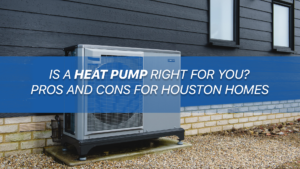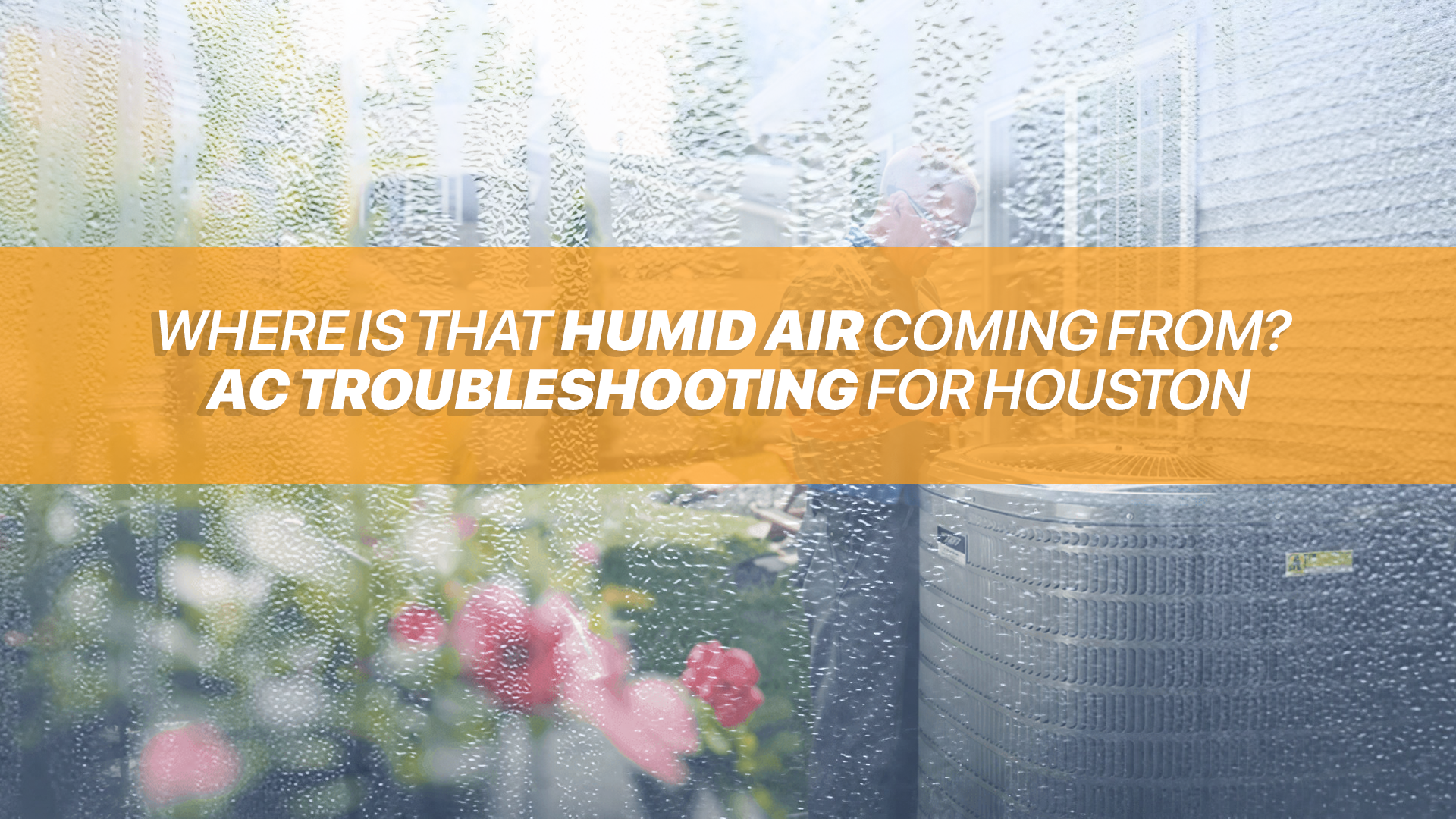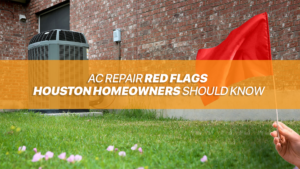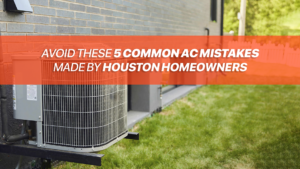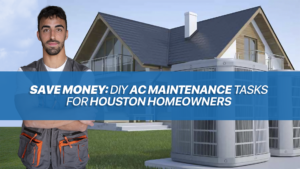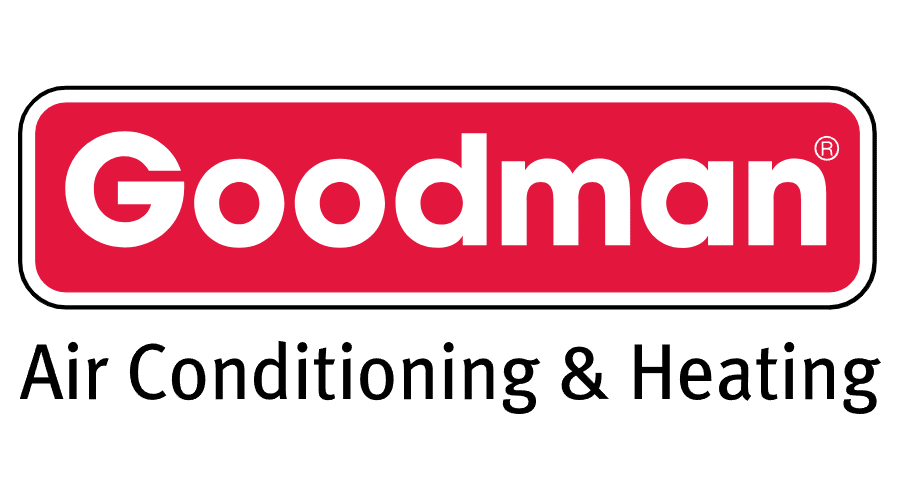The hot and humid Houston climate can take a major toll on your home’s air conditioning system with AC Blowing Humid Air. When your AC starts blowing humid air or stops cooling properly, it’s frustrating trying to pinpoint the issue. Is it time to call for professional AC repair, or can you troubleshoot and fix it yourself? This guide will walk Houston homeowners through common AC problems, symptoms to watch for, and DIY troubleshooting tips before calling for service. Read on to learn where that uncomfortable humid air could be coming from and how to get your cooling system working its best again.
Why Does My AC Blow Humid Air?
If your AC blows humid air even when set to the lowest temperature, something is preventing it from properly dehumidifying the air. There are a few common culprits behind a lack of cooling power and moisture control:
Refrigerant Leaks
The refrigerant is the substance in your AC system that absorbs heat from inside your home and expels it outside. When refrigerant levels get low due to a leak, your AC won’t effectively cool and dehumidify the air. Signs of a refrigerant leak include:
- Higher electric bills from an overworked AC system
- Lukewarm air blowing from the vents
- AC running constantly but failing to reach the set temperature
- Frost or ice buildup on the outdoor AC unit
Refrigerant leaks can occur at joints and seals or from a corroded AC coil. Only a certified HVAC technician has the tools and expertise to locate and repair leaks. Attempting DIY refrigerant repairs will void your AC warranty.
Dirty Air Filter
Your AC system relies on a clean air filter to circulate air properly. When clogged with dust and debris, airflow is restricted, forcing your AC to work harder to push air through the vents. A dirty filter prevents the evaporator coil from absorbing heat and moisture. You’ll notice humidity lingering indoors as your AC blows warm, unconditioned air. Check your air filter each month and replace it as needed to maintain airflow.
Frozen AC Evaporator Coil
The evaporator coil inside your AC absorbs heat from your home’s air. Under certain conditions, it can start to freeze over, which blocks airflow and cooling capabilities. Causes include:
- Low refrigerant levels
- Very dirty air filter
- Extremely hot outdoor temperatures
Signs of a frozen evaporator coil include little to no cold air coming from vents and the outdoor AC unit not running while indoor air blows. Turn your AC off and allow the frozen coil to thaw completely before restarting it.
Improper Drainage
As the evaporator coil removes humidity from the air, condensation drips into a drain pan and out of your home through a condensate drain line. When the drain line gets clogged, water can’t exit properly. The overflowing drain pan then recirculates moisture back into the air supply. Ensure drainage stays clear by pouring a mix of vinegar and water down the line annually. Signs of a clogged drain line include water leaking from the indoor unit or musty smells from mold growth. Call a professional to clear severe clogs.
AC Oversized for Your Home
Having an AC unit too large for your home’s square footage leads to humidity issues. Oversized units cool your home too quickly to properly dehumidify the air before shutting off. Then, lingering moisture causes that muggy feeling indoors. If your AC was installed recently, check that the tonnage matches the size recommended for your home. Units more than 1.5 tons too large for the space should be replaced with a properly sized model.
DIY AC Troubleshooting Tips
Before calling for HVAC service, try these simple troubleshooting steps to identify and resolve common AC problems:
1. Check the thermostat settings : Make sure your thermostat is set to COOL mode and the temperature is lower than the indoor reading. The system won’t activate otherwise. Check the thermostat batteries if adjusting settings doesn’t help.
2. Look for dirty air filters : Turn off power to your AC unit and remove the filter. If it’s coated in dust and debris, replace it with a new one of the same size. Run the AC to see if airflow improves.
3. Clear debris from the outdoor unit : Leaves, grass clippings and other debris can obstruct airflow around the condenser. Carefully clear away any buildup with a hose or broom.
4. Check the condensate drain line : Remove the drain line at the point it exits your home. Pour water through to ensure it drains freely. If clogged, use a drain snake or compressed air to clear the blockage.
5. Make sure vents aren’t obstructed : Close all windows and doors to isolate the issue to your AC system. Ensure ceiling vents aren’t blocked by furniture or other objects restricting airflow.
6. Allow time for the AC to catch up : On extremely hot days, it can take awhile for your AC to cool your home after being off all day. Set the temperature lower and allow it to run for a few hours to remove built-up heat and humidity.
7. Listen for odd noises : Unusual sounds like squealing, grinding or buzzing indicate a mechanical issue. Make note of the noise and call an HVAC technician.
8. Check for electrical problems : If your outdoor AC unit isn’t running at all, listen for humming at the control board. No sound could mean a tripped breaker or blown fuse. Check for power issues before calling for service.
9. Monitor for freezing : Feel the two copper lines at the outdoor unit. If both are room temperature, there’s likely a refrigerant issue. If one is warm and one has frost, the evaporator coil is freezing up.
10. Consider a professional inspection : If warm air continues blowing after basic troubleshooting, it’s best to have a certified HVAC technician inspect your entire system and properly diagnose the issue.
Calling a professional after initial troubleshooting prevents wasted visits if the problem is something simple you could fix yourself. However, refrigerant leaks, drain clogs and electrical issues require specialized tools, testing equipment and licensed expertise.
When Do I Need Professional AC Service?
While DIY maintenance can solve many minor cooling issues, other problems inevitably require professional service, including:
- Refrigerant leaks – Only certified HVAC technicians legally handle refrigerant repairs per EPA rules. Leaks require specialized equipment to locate and seal.
- Evaporator coil replacement – If the coil is damaged beyond repair, a technician must recover the refrigerant, replace the coil, and recharge the system properly.
- Compressor failure – Faulty compressors must be replaced and the refrigerant system evacuated and recharged. This requires professional expertise.
- Major drain clogs – Severe condensate drain obstructions located in the wall or unit often require a plumber or HVAC technician to clear.
- Electrical issues – Professionals have the tools to diagnose electrical problems and safely access sealed control boards or wiring.
- System replacement – If your AC is over 10 years old and no longer cools effectively, replacement by a certified installer may be your best option.
Proper licensing ensures technicians handle refrigerants safely and comply with codes. This protects your AC system while providing reliable, lasting repairs.
Find a Reputable Houston AC Company
Don’t leave your home’s cooling to just any HVAC company. Finding a reputable AC repair technician in Houston is key to getting your issue properly diagnosed and resolved. Look for:
- NATE certification – Technicians carrying this credential have passed rigorous testing to prove their expertise.
- Local reputation – Read reviews and ask neighbors for recommendations of AC companies with proven records.
- Upfront pricing – Beware of vague service call fees. Quality companies will provide fair pricing ahead of visits.
- Available warranties – Well-trained technicians stand behind their service work with labor warranties of 1 year or longer.
- Inventory of parts – Companies should have access to a full inventory of AC parts to prevent delays waiting on shipments.
Turbo Home Services meets all the above criteria for trustworthy AC repair in Houston. Contact us at (281) 626-5938 to schedule service by our highly-trained, NATE-certified technicians.
Stay Cool with Proactive AC Maintenance
Don’t wait until your AC fails in the peak of Houston’s sweltering summers. Stop humid air in its tracks with smart preventative maintenance:
- Change air filters monthly to maintain airflow.
- Clear debris from the outdoor unit regularly to prevent obstruction.
- Pour vinegar down the drain line annually to keep it clear.
- Have your system inspected by a professional before each cooling season.
Minor issues caught early are cheaper to repair. Routine maintenance also keeps your AC operating at peak efficiency for energy savings. Let the AC experts at Turbo Home Services keep your cooling system running in top shape. Contact us online or call (281) 626-5938 to schedule comprehensive AC maintenance and rest easy this summer.
